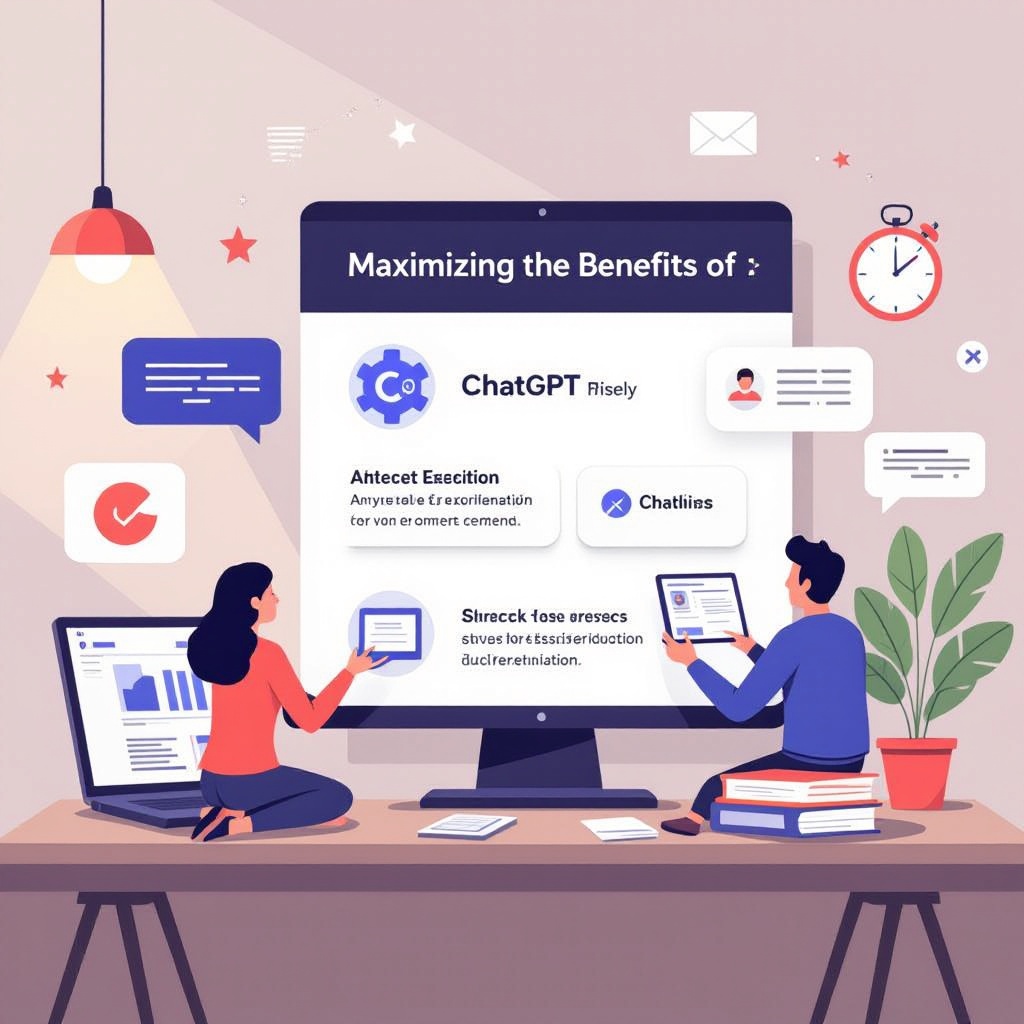AI tools like ChatGPT are making waves in the academic world, revolutionizing how assignments are approached. These technologies enhance the processes of brainstorming, drafting, and feedback, significantly transforming traditional educational methodologies. However, it is crucial to understand their role as supplements to conventional methods. This measured approach not only ensures the ethical use of AI but also helps to retain students’ unique voices and critical thinking skills. The integration of AI in education thus brings about a balanced blend of innovation and authenticity, setting a new standard for academic excellence.
Key Takeaways
- Using ChatGPT regularly can uplift both student confidence and writing quality.
- AI tools are ideal for brainstorming and drafting but shouldn’t replace personal insights.
- Citation and transparency are vital to maintaining academic integrity with AI-generated content.
- These tools can aid writing skills, especially for non-native English speakers, by helping with structure and grammar.
- Always fact-check AI-generated information to guarantee the accuracy of academic work.
Leveraging AI Tools: A Guide to Using ChatGPT Wisely in Academic Assignments
Simple usage of AI like ChatGPT in assignments doesn’t just replace traditional methods. It complements them. This tool is great for brainstorming, drafting, and seeking feedback. With 400 million weekly users by 2025, ChatGPT’s popularity in academic settings can’t be overlooked.
Data shows about 60% of students feel confident using ChatGPT, and 70% find it enhances writing quality. If you’re considering using ChatGPT, regular interaction is key.
Consistent use in 21–60% of assignments boosts both confidence and writing prowess. The strong correlation coefficients (r=0.67 and r=0.72, p < 0.01) demonstrate its impact. Follow these insights to maximize its benefits:
- Use ChatGPT for initial brainstorming.
- Rely on it for drafting complex sections.
- Seek feedback on structure and coherence.
These strategies ensure ChatGPT becomes a valuable academic ally.

Balancing AI Assistance with Critical Writing Skills
ChatGPT can boost your vocabulary and linguistic complexity. However, it may simplify your sentence structure and affect cohesion and readability. AI-generated essays flow naturally. Yet, they often lack the engagement and persuasive elements found in student-written pieces.
I suggest leveraging AI for developing your writing skills. Here’s how you can make the best of both worlds:
- Compare AI-generated content with your drafts.
- Identify areas for improvement.
- Maintain your unique voice through revisions.
This approach ensures your assignments retain your personal flair while benefiting from AI’s strengths.
Ethical Use of AI: Upholding Academic Integrity
Appropriate use of ChatGPT means openly acknowledging AI support in your academic work. Misusing it can cause plagiarism and academic misconduct. Different institutions have their own guidelines on AI usage. It’s crucial to follow your course’s specific instructions to steer clear of penalties. Here are some best practices for maintaining ethical academic conduct:
- Utilize plagiarism detection tools to ensure originality.
- Create unique responses rather than copying generated text.
- Properly cite AI tools to acknowledge their assistance.
By following these recommendations, you safeguard your academic reputation and ensure honest engagement with AI tools. Always check with your institution for the most current guidelines.

Maximizing the Benefits of ChatGPT: Effective and Responsible Use
Engaging actively with AI tools can greatly aid in crafting assignments. Use ChatGPT for brainstorming ideas, outlining arguments, or refining drafts. Remember to infuse personal insights and maintain a unique voice in your submissions. AI occasionally produces plausible but inaccurate information. To combat this, always fact-check the content. Also, verify any references and citations, as these can sometimes be incorrect.
For non-native English writers, AI tools offer support in enhancing logical structure and fluency. They should complement your writing, not replace your personal development. Consider using AI for:
- Brainstorming and idea generation
- Crafting outlines and structuring arguments
- Draft refinement and grammar checks
By integrating these methods, you can ensure a more effective and responsible use of AI while maintaining your distinct writing identity.

Insights and Comparisons: Human vs. AI-Written Work
In comparing student-written and AI-generated work, you’ll notice a few differences. Student compositions often show high levels of engagement and originality. They can be more readable because they’re infused with personal insights and authentic perspectives. AI-generated content, while fluent and orderly, lacks the critical thinking and personal engagement that makes human work unique.
Remember, AI-generated text must have proper citations to distinguish it from original work. This is important for academic integrity and transparency. While AI impresses with its linguistic abilities, it can’t replicate the depth of understanding personal experience brings. So, engage with AI tools wisely, blending AI with your own insights for more enriched assignments.

A Student’s Checklist: Integrating ChatGPT Responsibly
Before diving into using AI tools like ChatGPT, it’s essential to look into your course and institutional policies. Different institutions have varying rules regarding AI use in assignments. Make sure you’re clear on these guidelines to avoid any academic issues.
Using AI for assignments can significantly enhance your work, but it’s crucial to use it the right way. It’s best to rely on AI for brainstorming, outlining, and obtaining feedback. AI shouldn’t be your main answer engine for final submissions, as this can undermine your learning process.
Incorporating AI into your assignments doesn’t mean sacrificing your perspective. Always inject personal insights and make it clear when AI tools contribute to your academic work. This transparency not only maintains academic integrity but also shows your commitment to creating original content.
It’s important to regularly fact-check any content or citations that AI generates. Ensure that the information provided aligns with accurate and credible sources, as inaccuracies can easily slip through unchecked. Treat these tools as learning aids that support the development of your skills while benefiting from the technological assistance they provide.
Consider these points for integrating AI into your academic work responsibly:
- Understand course and institutional policies regarding AI.
- Use AI for generating ideas and drafting, not as your primary solution.
- Include your thoughts in AI-generated work and transparently credit AI usage.
- Verify all information and references provided by AI for accuracy.
By following these guidelines, you can harness AI’s potential while maintaining the integrity and authenticity of your academic endeavors.

8 Comments
[…] AI and Technology in Academic Writing: The UAE Edge […]
[…] are increasingly incorporating generative AI in their teaching methods, preparing students for future challenges. Esteemed institutions like […]
[…] technologies like AI, Machine Learning, and blockchain are setting new standards. AI proctoring is revolutionizing how […]
[…] AI-powered tools also automate administrative tasks. Grading? That’s a cinch now, freeing teachers to focus on teaching. These tools foster inclusivity by providing accessible learning options for all students, like voice recognition software that aids those with reading difficulties. […]
[…] Artificial intelligence and data science are vital for future job markets, offering significant growth and attractive salaries for specialists. […]
[…] year. Led by Sheikh Mohammed bin Rashid Al Maktoum, this effort dives deeper than just teaching AI concepts. It immerses students in a rich understanding of digital environments, setting a remarkable global […]
[…] impact on academic output is noticeable. Not only do assignments come together faster, but they also reach a higher standard of quality. Writers find they produce more insightful, […]
[…] the 2025–2026 academic year, artificial intelligence will be a compulsory subject for all students in UAE government schools, beginning in Kindergarten […]